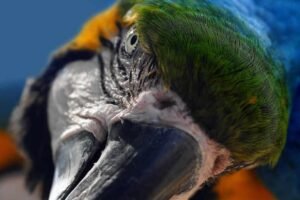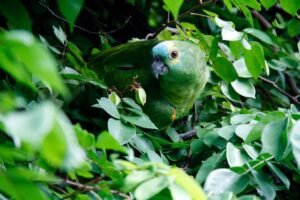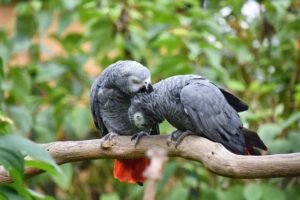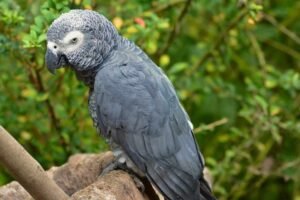Can parrots swim? No. Unlike some bird species, parrots cannot swim in the water. They don’t have webbed feet that could allow them to maintain their balance on water surfaces. Plus, their bodies are not naturally designed to do so. If you put a parrot in a bucket full of water or into a swimming pool, it might keep its head above water by flocking around but is likely to drown in a while out of exhaustion.
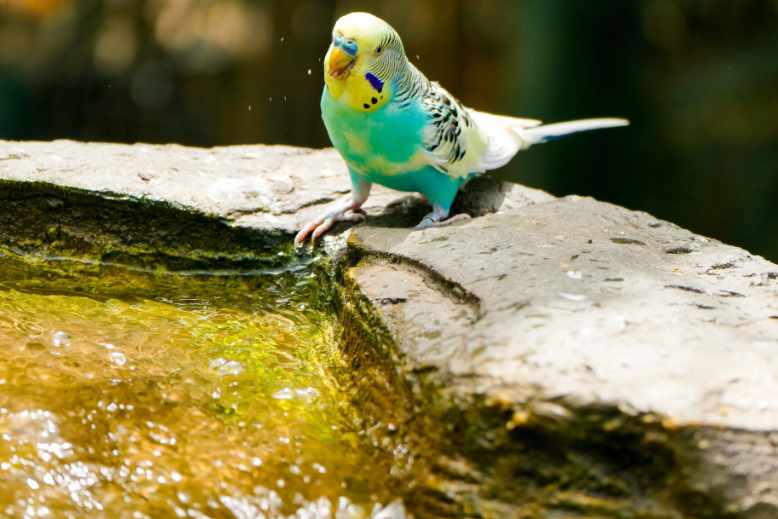
As avian admires, we notice a lot of birds floating on the water and even diving down into it, geese, penguins, and ducks, to name a few. So it is natural for us to get curious about our talkative companions and wonder, can parrots swim? If we were to put our pet parrot into the water, would it be able to reach the other end? Are they good swimmers?
Let’s find out.
Can parrots swim?
In a word, no. Parrots are unable to swim. While some of their species, like parakeets, can walk on the water surface, most prefer flying or walking on the dry lands.
Unlike surface swimming birds, parrots do not have hollow bones and lightweight skeletons that could help them propel through the water.
Plus, in contrast to aquatic creatures, they have air sacs in the chest cavity, making it impossible for parrots to stay underwater for long periods. The absence of webbed feet also makes it harder for a parrot to maintain its balance on the water. They can only push with their toes, which sadly doesn’t offer enough power to cross water surfaces. As a result, they sink like a stone rather than swim.
Can parrots float?
Yes. Parrots are perfectly capable of floating on water.
While these colourful creatures aren’t great swimmers, most healthy adults can float really well. Many parrot species actually prefer floating on swimming and can float even better than humans. Floating allows them to relax and enjoy the environment around them. Plus, they have less dense bodies and air sacks, helping them to be more exuberant.
Nevertheless, this does not mean you should experiment by putting your parrot in the pool and expect him to float like a pro. Most parrots panic when their feet aren’t on solid ground, which can eventually lead to drowning.
Can you give your parrot a bath?
Yes, you sure can!
Most parrots love splashing around in the water during their bath time. So it is absolutely fine to bathe your parrot every once in a while. However, there are some rules that parrot parents need to follow to make bath time a fun experience for their feathered baby.
- You should always bathe your parrot in shallow water. Make sure the little fellow can touch the bottom and both of his feet are on solid ground, so he does not get panic.
- Always keep the bath water levels low. It will make this whole bathing experience a bit more enjoyable for you and your pet, of course.
- Never soak your parrot’s feathers entirely, as it makes them uncomfortable. Even in the wild, parrots never allow their feathers to be completely drenched in water, as excessive soaking hinders their flying abilities. Plus, it can lead to extreme body heat loss.
- Use only plain water for bathing your pet.
- Do not use any sort of special bird shampoos as they are an unnecessary expense. A bird’s body already produces oil that cleans its feathers. Using a bird shampoo can remove the natural oils, resulting in unhealthy and dull feathers.
- Never bathe your pet at night. If your parrot does need a bath, bath the fellow only during the warmest hours of the day. It is because when parrots are wet, they can become easily chilled, leading to numerous health concerns.
- Always ensure that your little fellow has an opportunity to bathe and dry off before the temperature starts to go down.
- Only use room temperature or lukewarm water for bathing purposes.
- Bathing your parrot in freezing temperatures can lead to heat loss while bathing in boiling temperature can shock your beloved pet’s system and cause burns. So it is best to opt for a temperature that is neither too cold nor too hot. Generally, the temperature of about 100 degrees Fahrenheit works well for most parrot species.
Can you give your parrot a shower?
Yes.
Parrots experience showers with heavy rainfalls in their natural habitat, and an at-home shower can stimulate this experience for your little buddy.
Most parrots love having a shower, which can be a great entertainment opportunity for both of you. Plus, the only thing you need to do in the shower is supervise your little pet. Parrots naturally have a self-cleaning oil in their skin, and they groom themselves quite easily. Owners don’t need to wash, scrub or shampoo them at all.
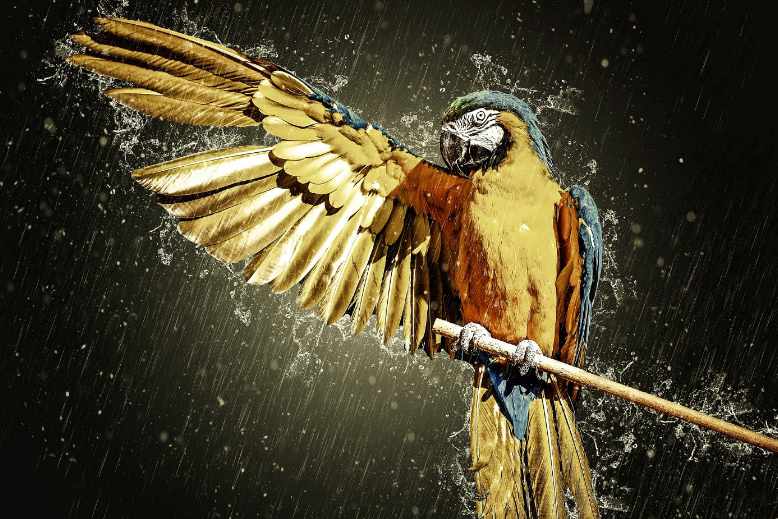
If you are not comfortable with putting your pet in the shower, take him out during lite rainfalls or use a spray bottle and gently spray the birdie down. But if you are okay with showering your pet, getting a shower perch would be a nice idea. These perches have suction cups that attach them to shower walls, and they also come with an extended arm that swings out so your parrot can sit comfortably during his shower time.
Should I blow dry my parrot?
No. It won’t be really thoughtful of you to blow dry your parrot as they don’t need it. As long as they have healthy feathers, they won’t absorb that much water. Plus, the excess water that needs to be dried off will usually be done by your parrot. If you give your little fellow enough room, he will simply flap his wings to dry them off. You can towel dry your parrot, but that isn’t necessary.
Blow drying, on the other hand, can actually be highly risky for many birds. The heat from the blow dryer may cause burns and damage your parrot’s beautiful feathers. Plus, some dryers have a nonstick coating on their heat coils which can be fatal to your parrot.
Can you bathe a baby parrot?
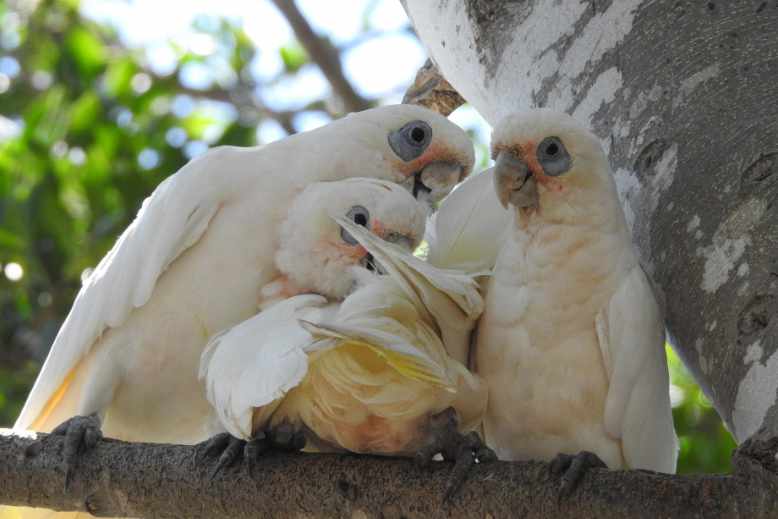
Unlike adult parrots, juveniles require frequent bathing. It is because all parrot species produce something known as powder drown, and everything, including dirt and dust, sticks to it.
Once the dust is stuck, the bird can exercise, and the excess powder falls down along with the dust. Younglings, however, are unable to produce their own powder down. They rely on their parents to clean themselves. This advantage isn’t available in captivity, so their ability to keep themselves clean diminishes. Thereby pet parents need to give their juveniles more frequent baths than adults.

